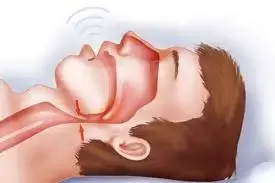- Home
- Medical news & Guidelines
- Anesthesiology
- Cardiology and CTVS
- Critical Care
- Dentistry
- Dermatology
- Diabetes and Endocrinology
- ENT
- Gastroenterology
- Medicine
- Nephrology
- Neurology
- Obstretics-Gynaecology
- Oncology
- Ophthalmology
- Orthopaedics
- Pediatrics-Neonatology
- Psychiatry
- Pulmonology
- Radiology
- Surgery
- Urology
- Laboratory Medicine
- Diet
- Nursing
- Paramedical
- Physiotherapy
- Health news
- Fact Check
- Bone Health Fact Check
- Brain Health Fact Check
- Cancer Related Fact Check
- Child Care Fact Check
- Dental and oral health fact check
- Diabetes and metabolic health fact check
- Diet and Nutrition Fact Check
- Eye and ENT Care Fact Check
- Fitness fact check
- Gut health fact check
- Heart health fact check
- Kidney health fact check
- Medical education fact check
- Men's health fact check
- Respiratory fact check
- Skin and hair care fact check
- Vaccine and Immunization fact check
- Women's health fact check
- AYUSH
- State News
- Andaman and Nicobar Islands
- Andhra Pradesh
- Arunachal Pradesh
- Assam
- Bihar
- Chandigarh
- Chattisgarh
- Dadra and Nagar Haveli
- Daman and Diu
- Delhi
- Goa
- Gujarat
- Haryana
- Himachal Pradesh
- Jammu & Kashmir
- Jharkhand
- Karnataka
- Kerala
- Ladakh
- Lakshadweep
- Madhya Pradesh
- Maharashtra
- Manipur
- Meghalaya
- Mizoram
- Nagaland
- Odisha
- Puducherry
- Punjab
- Rajasthan
- Sikkim
- Tamil Nadu
- Telangana
- Tripura
- Uttar Pradesh
- Uttrakhand
- West Bengal
- Medical Education
- Industry
Persistent Loss of smell associated with long COVID could be permanent: JAMA

According to an observational study published in JAMA Netw Open conducted on unvaccinated long-COVID patients with neurologic symptoms, 64% of patients had a persistently impaired sense of smell, which could be permanent.
Determining the characteristics, type, and severity of olfactory dysfunction in patients with long COVID is important for the prognosis and potential treatment of the affected population.
A study was conducted to describe the sociodemographic and clinical features of patients with long COVID who develop persistent olfactory dysfunction.
This cross-sectional study, conducted at a rehabilitation centre at a public university in the Amazon region of Brazil between September 9, 2020, and October 20, 2021, comprised 219 patients with long COVID and self-reported neurologic symptoms. Of these 219 patients, 139 received a diagnosis of chronic olfactory dysfunction, as confirmed by the Connecticut Chemosensory Clinical Research Center (CCCRC) test.
Results:
- Of the 219 patients included in the study, 164 (74.9%) were women, 194 (88.6%) were between 18 and 59 years of age, 206 (94.1%) had more than 9 years of education, and 115 (52.5%) had a monthly income of up to US $192.00.
- In the study group, 139 patients (63.5%) had some degree of olfactory dysfunction, whereas 80 patients (36.5%) had normosmia.
- Patients with olfactory dysfunction had a significantly longer duration of long COVID symptoms than those in the normosmia group
- Among patients with anosmia, there was a significant association between olfactory dysfunction and daily activities, especially in terms of impairment in hazard detection, personal hygiene
- Univariable logistic regression analyses found that ageusia symptoms were associated with the occurrence of olfactory dysfunction whereas headache and sleep disorders showed an inverse association with the occurrence of olfactory dysfunction.
Olfactory dysfunction is one of the most important long-term neurologic symptoms of COVID-19, with the highest prevalence seen among women, adults, and outpatients. Patients with olfactory dysfunction may experience persistent severe hyposmia or anosmia more than 1 year from the onset of symptoms, suggesting the possibility of the condition becoming a permanent sequela.
Reference:
Mendes Paranhos AC, Nazareth Dias ÁR, Machado da Silva LC, et al. Sociodemographic Characteristics and Comorbidities of Patients With Long COVID and Persistent Olfactory Dysfunction. JAMA Netw Open. 2022;5(9):e2230637. doi:10.1001/jamanetworkopen.2022.30637
Keywords:
Sociodemographic, Characteristics, Comorbidities, Patients, Long, COVID, Persistent, Olfactory Dysfunction, Alna Carolina Mendes Paranhos, Nazareth Dias ÁR, Machado da Silva LC, JAMA Netw Open
Dr. Shravani Dali has completed her BDS from Pravara institute of medical sciences, loni. Following which she extensively worked in the healthcare sector for 2+ years. She has been actively involved in writing blogs in field of health and wellness. Currently she is pursuing her Masters of public health-health administration from Tata institute of social sciences. She can be contacted at editorial@medicaldialogues.in.
Dr Kamal Kant Kohli-MBBS, DTCD- a chest specialist with more than 30 years of practice and a flair for writing clinical articles, Dr Kamal Kant Kohli joined Medical Dialogues as a Chief Editor of Medical News. Besides writing articles, as an editor, he proofreads and verifies all the medical content published on Medical Dialogues including those coming from journals, studies,medical conferences,guidelines etc. Email: drkohli@medicaldialogues.in. Contact no. 011-43720751


